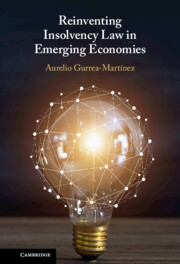Book contents
- Reinventing Insolvency Law in Emerging Economies
- Reinventing Insolvency Law in Emerging Economies
- Copyright page
- Dedication
- Contents
- Figures
- Tables
- Preface
- Acknowledgments
- Table of Cases
- Table of Legislation and Other Instruments
- Abbreviations
- Part I Foundations
- Part II Features and Challenges of Insolvency Law in Emerging Economies
- Part III Towards a New Insolvency Framework in Emerging Economies
- 4 Promotion of Workouts and Hybrid Procedures
- 5 Directors’ Duties in the Zone of Insolvency in Emerging Economies
- 6 Implementation of a Simplified Insolvency Framework for Micro- and Small Enterprises
- 7 Tweaking Ordinary Insolvency Proceedings
- 8 Favoring the Choice of Insolvency Forum
- Part IV The Future of Insolvency Law
- Glossary
- Index
7 - Tweaking Ordinary Insolvency Proceedings
from Part III - Towards a New Insolvency Framework in Emerging Economies
Published online by Cambridge University Press: aN Invalid Date NaN
- Reinventing Insolvency Law in Emerging Economies
- Reinventing Insolvency Law in Emerging Economies
- Copyright page
- Dedication
- Contents
- Figures
- Tables
- Preface
- Acknowledgments
- Table of Cases
- Table of Legislation and Other Instruments
- Abbreviations
- Part I Foundations
- Part II Features and Challenges of Insolvency Law in Emerging Economies
- Part III Towards a New Insolvency Framework in Emerging Economies
- 4 Promotion of Workouts and Hybrid Procedures
- 5 Directors’ Duties in the Zone of Insolvency in Emerging Economies
- 6 Implementation of a Simplified Insolvency Framework for Micro- and Small Enterprises
- 7 Tweaking Ordinary Insolvency Proceedings
- 8 Favoring the Choice of Insolvency Forum
- Part IV The Future of Insolvency Law
- Glossary
- Index
Summary
This chapter argues that, even if emerging economies actively promote hybrid procedures and workouts and they create a simplified insolvency framework for micro- and small enterprises (MSEs), ordinary insolvency proceedings will still play a significant role in the economy. On the one hand, they will serve as the primary mechanism for the reallocation of assets of nonviable medium and large enterprises (MLEs). On the other hand, formal reorganization procedures can still be relevant for viable MLEs unable to complete a workout or hybrid procedure due to the lack of trust on the debtor’s management team or the need to use some provisions exclusively available in formal insolvency proceedings. Therefore, emerging economies should make sure to improve the efficiency of their ordinary insolvency proceedings. Nonetheless, they cannot adopt the type of complex procedure heavily supervised by courts existing in countries with strong institutional environments. Instead, they should design a procedure requiring a minimum involvement of courts. The chapter explains how this goal can be achieved while enhancing the attractiveness of ordinary insolvency proceeding for debtors and creditors.
Keywords
- Type
- Chapter
- Information
- Reinventing Insolvency Law in Emerging Economies , pp. 208 - 247Publisher: Cambridge University PressPrint publication year: 2024



